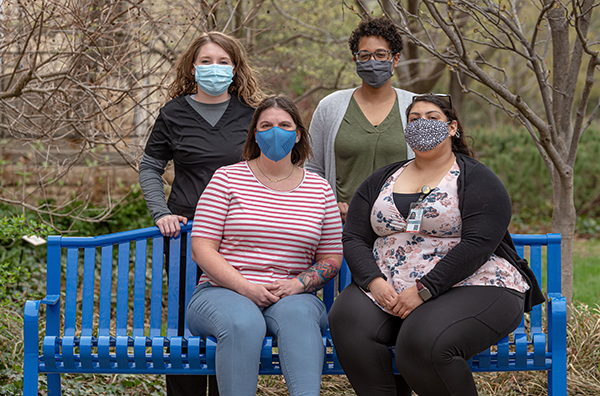Hard Questions
Suicide intervention training available through Washburn

From The Ichabod - Spring 2021
By Jensen Simons
“Have you ever thought about taking your own life?”
It is as intimidating a question to receive as it is to ask.
Being prepared to ask these kinds of questions comfortably and confidently doesn’t come easy to many but proper training can help. The Applied Suicide Intervention Skills Training program at Washburn University seeks to offer that special training.
Beth O’Neill, assistant professor, social work, finds this training is valuable for everyone because suicide can touch anyone’s life. She knows because it happened to her; the first time being when she was in high school. Her friend called and told her plainly he was seriously contemplating suicide. At 16 years old, she had no idea how to respond. Although the friend was able to find help, she still remembers how helpless she felt at that moment.
“He not only had a plan but was ready to implement that plan right then,” she said. “I just wished I had been prepared to have these conversations for people I cared about.”
O’Neill said the two-day ASIST training session is targeted specifically to social work students.
“ASIST is designed to be a suicide first aid program that could prepare anyone to intervene in these crisis situations,” she said.
The training forces participants to focus on asking the hard questions in real time with real people. This role-playing portion of the training lets participants become comfortable having these direct conversations, while also applying what they’ve learned from the lecture and theory portions of the class, such as identifying the first signs or risk factors a person is having or developing thoughts of suicide.
“From a professional standpoint, I really wanted to jump on this opportunity to equip our Washburn students with the skills that they’re going to need when they get out in the community so that they can benefit the broader public,” O’Neill said.
Due to COVID-19, it’s been over a year since the last ASIST program took place, but it will resume during the 2021-22 school year. ASIST is funded in part by Washburn Women’s Venture Partners and the Brenneman Series, two Washburn programs that funnel private donations to worthy and impactful programs and projects.
Two social work graduate students still carry with them the lessons they learned in this training. Stephanie Carrillo, certificate ’15, bsw ’20, and RaeLynn McClelland, certificate ’16, bsw ’20, conceded that prior to the training they felt helpless, uncomfortable or overwhelmed when faced with the topic of suicide.
“A lot of people think if you bring up suicide, you’ve already put it in their head,” McClelland said. “And, while that to me isn’t true, I was worried about imposing my way of thinking onto someone else. This training, especially the role play, helped me learn about other methods to talk about it in more of a sensitive way.”
Prior to her training, Carrillo was impacted by an attempted suicide during her internship at a high school. The entire school was still reeling after one of its students had been shot and killed. Not long after, Carrillo found out a student she worked closely with attempted suicide due in part to the recent traumatic event. The young intern was disgusted with herself for not having seen the warning signs.
“I had no words and I wanted to do much more,” she said.
Carrillo credits the hands-on, interactive nature of the training for challenging her, as well as the lecture and theory portion for giving her tools to utilize in practice.
“After this program you look at life a little differently,” Carrillo said. “You are able to have this conversation with people who are currently feeling suicidal and ask them, ‘Are you thinking about suicide?’ And it’s either a ‘yes’ or ‘no’ answer that you get, and if they tell you ‘no,’ you have to take their word for it. If you feel they may need more help you make sure they have a plan at hand and have the numbers of who they are able to talk to and who can support them. With this in place, you make sure they have support around them and continue to follow up.”
McClelland believes transparency is the key to having more productive discussions regarding suicide.
“Death is a very difficult topic in general for people,” she said. “’Do you feel safe right now?’ ‘Are you okay?’ ‘What would be helpful?’ These questions can help support an open line of communication.”